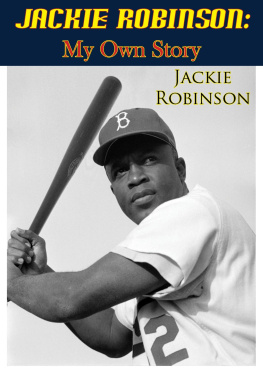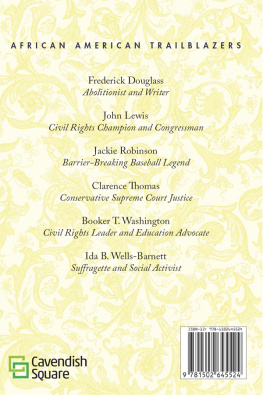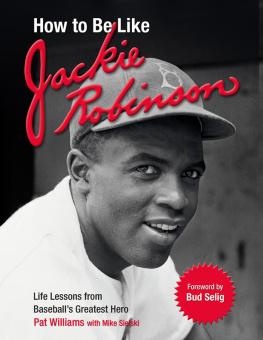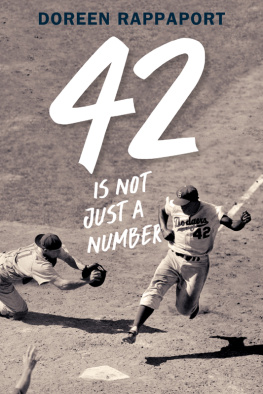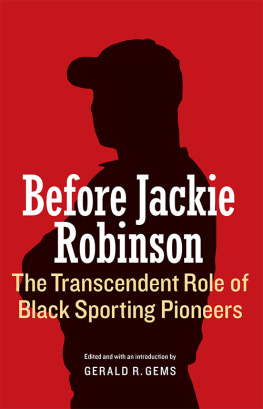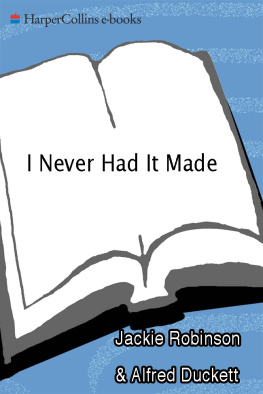Jackie Robinson - Jackie Robinson: My Own Story
Here you can read online Jackie Robinson - Jackie Robinson: My Own Story full text of the book (entire story) in english for free. Download pdf and epub, get meaning, cover and reviews about this ebook. year: 2016, publisher: Golden Springs Publishing, genre: Detective and thriller. Description of the work, (preface) as well as reviews are available. Best literature library LitArk.com created for fans of good reading and offers a wide selection of genres:
Romance novel
Science fiction
Adventure
Detective
Science
History
Home and family
Prose
Art
Politics
Computer
Non-fiction
Religion
Business
Children
Humor
Choose a favorite category and find really read worthwhile books. Enjoy immersion in the world of imagination, feel the emotions of the characters or learn something new for yourself, make an fascinating discovery.
- Book:Jackie Robinson: My Own Story
- Author:
- Publisher:Golden Springs Publishing
- Genre:
- Year:2016
- Rating:4 / 5
- Favourites:Add to favourites
- Your mark:
- 80
- 1
- 2
- 3
- 4
- 5
Jackie Robinson: My Own Story: summary, description and annotation
We offer to read an annotation, description, summary or preface (depends on what the author of the book "Jackie Robinson: My Own Story" wrote himself). If you haven't found the necessary information about the book — write in the comments, we will try to find it.
Jackie Robinson: My Own Story — read online for free the complete book (whole text) full work
Below is the text of the book, divided by pages. System saving the place of the last page read, allows you to conveniently read the book "Jackie Robinson: My Own Story" online for free, without having to search again every time where you left off. Put a bookmark, and you can go to the page where you finished reading at any time.
Font size:
Interval:
Bookmark:


This edition is published by PICKLE PARTNERS PUBLISHINGwww.pp-publishing.com
To join our mailing list for new titles or for issues with our books picklepublishing@gmail.com
Or on Facebook
Text originally published in 1948 under the same title.
Pickle Partners Publishing 2015, all rights reserved. No part of this publication may be reproduced, stored in a retrieval system or transmitted by any means, electrical, mechanical or otherwise without the written permission of the copyright holder.
Publishers Note
Although in most cases we have retained the Authors original spelling and grammar to authentically reproduce the work of the Author and the original intent of such material, some additional notes and clarifications have been added for the modern readers benefit.
We have also made every effort to include all maps and illustrations of the original edition the limitations of formatting do not allow of including larger maps, we will upload as many of these maps as possible.
JACKIE ROBINSON: MY OWN STORY
AS TOLD BY JACKIE ROBINSON TO WENDELL SMITH
of The Pittsburgh Courier and the Chicago Herald American
FOREWORD BY BRANCH RICKEY
Contents
BY BRANCH RICKEY
Jackie Robinson has asked pie to write a Foreword to his book, which is an autobiography beginning with his athletic career and dealing particularly with baseball. It seems to me, it must have been very difficult to tell his story.
In writing this book, Robinson, I am sure, did not intend to create the impression that he has already achieved ultimate success as a player or that his advent to baseball represents any more than the first step toward equal participation by Negroes in this great American sport. I know that, above all, he intended to make good as a ball player when he first joined the Brooklyn organization. Nevertheless, he sensed the delicate racial responsibility which his association with white players involved.
Jackie is well educated, as we generally understand that word. He is a good sportsman and a gentleman. On the field he has proven himself to be a good player with fine physical abilities and most unusual aptitudes.
His appearance with the Brooklyn Club in the spring of 1947 was marked in a most singular manner. He had never been a first baseman; his knowledge of the position derived exclusively from observation. He did a grand job as the regular first baseman, and helped materially to win the National League pennant for the Brooklyn Club.
His greatest achievement, however, in my judgment, was his tactful handling of his relationship with his fellow players, as well as his opponents; and the fact that he was able to maintain the favorable regard of the press and the public.
Jackie is naturally a competitora combative competitor. He resents unfairness or unsportsmanlike play directed toward his team or himself. Under no circumstances, however, could he allow himself to show resentment. Only those on the team know the great patience and self-control he exercised continuously throughout the season. For this exemplary conduct, displayed both off and on the field during the entire season, he deserves the commendation of everyone.
The book bespeaks the modesty and tact characteristic of his playing and general demeanor. I hope, in this new venture that he will have a sympathetic audience; I hope the sportswriters and fans will receive his book as readily as they have received his work on the playing field.
I believe that a mans race, color, and religion should never constitute a handicap. The denial to anyone, anywhere, any time of equality of opportunity to work is incomprehensible to me. Moreover, I believe that the American public is not as concerned with a first basemans pigmentation as it is with the power of his swing, the dexterity of his slide, the gracefulness of his fielding, or the speed of his legs.
And finally, heres hoping that this is the first of many good books this young man may write.
I WAS BORN ON JANUARY 31, 1919, IN CAIRO, GEORGIA, a little town near the Georgia-Florida line. My family named me John Roosevelt Robinson, after Teddy Roosevelt. They tell me I must have been destined to play on a ball club managed by Leo Durocher, because I immediately started squawking as though a bad decision had been called on me. And in one sense, it had. Every child born into poverty has one or two strikes on him before he starts the game.
I was the youngest of five children. The others were Matthew, Edgar, Willa Mae, and Frank. My father died a year after I was born, and my mother, Mollie Robinson, became the sole support for a family of five. By superhuman effort she carried on, toiling endless hours at all sorts of heavy manual labor. Those were hard times for all of us, but particularly for her. Yet, wonderful woman that she is, she was not content merely to feed and clothe us. She was determined to see that we got an education and had a chance to amount to something. Realizing that southern Georgia was hardly a land of opportunity for poor Negroes, she somehow mustered the means and the courage to move us to Pasadena, California, to live. It was still a constant struggle to make ends meet, but we kids began to help out by doing odd jobs, and at the same time we were going to schoolto good schools. That was what Mother had set her heart on.
As soon as I was old enough, I contributed my bit by shining shoes, running errands, selling newspapers, and hawking hot dogs at the baseball parks and football stadiums. Yet I had time for play, too, like any average kid. My cousins and I used to shag flies for older boys, and I can remember discovering then that I could run faster than most of the kids in our neighborhood.
Athletics, both school and professional, come nearer to offering an American Negro equality of opportunity than does any other field of social and economic activity. Fortunately, both my brother MatthewMack, we called himand I had some athletic ability. It made the going much easier for us than for our Negro schoolmates who were not athletically inclined.
Mack was a great athlete. He became famous long before anyone ever heard of me. He established the junior college broad jump record with a leap of twenty-five feet, and at the University of Oregon he became literally a one-man track team. He set a world record of 20.7 seconds for the 220 yard dasha record that stood until Jesse Owens broke it a few years later. These feats won him a place in our 1936 Olympic team.
Naturally, Mack was my idol. I used to watch him perform and say to myself: Gee, Id like to be a great athlete some day! Id like to be like Mack.
My first athletic achievements were as a softball player. I went in for all the other sports, too, but I liked softball the best. At Muir Technical High School in Pasadena, I played football and basketball, ran on the track team, but took only a mild interest in baseball.
When I finished high school, I entered Pasadena Junior College and rapidly developed into a pretty good all-around athlete. My proudest achievement, I think, was breaking Macks broad jump record. I leaped twenty-five feet, six and one-third inchesas against his twenty-five feet. To eclipse ones idol, even in one event, is a great thrill to any boy.
Since UCLA was nearby, I decided I would enroll there. Football, of course, was the major college sport. I loved to play it, and I was considered a good college prospect. One incident revealed to me the almost absurd emphasis on the game. When it became known that I was going to do my college work at UCLA, a devoted Stanford alumnus came to me and offered to finance my way through any school in the East that was not on Stanfords football schedule. He didnt want me to play against his Stanford teams!
Next pageFont size:
Interval:
Bookmark:
Similar books «Jackie Robinson: My Own Story»
Look at similar books to Jackie Robinson: My Own Story. We have selected literature similar in name and meaning in the hope of providing readers with more options to find new, interesting, not yet read works.
Discussion, reviews of the book Jackie Robinson: My Own Story and just readers' own opinions. Leave your comments, write what you think about the work, its meaning or the main characters. Specify what exactly you liked and what you didn't like, and why you think so.

